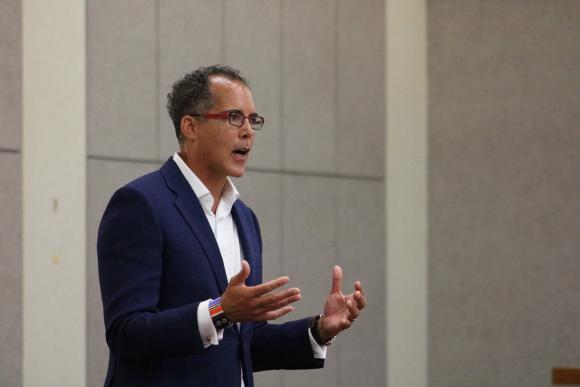
Pulitzer Prize-winning author James Forman Jr. was the keynote speaker.
Several factors can lead to the incarceration of young people of color – from labeling a child as a troublemaker from a young age, to children being subjected to poverty and a lack of family support.
However, experts who gathered at Rutgers University-Newark (RU-N) to look at racial disparities in juvenile justice also presented some solutions that can help vulnerable youth – from strengthening families with support and counseling – to trying to solve juvenile problems without involving law enforcement.
Youth advocates, attorneys, and scholars came together for the third annual Conference on Youth Development and Juvenile Justice in early June, which was titled “Racial Disparities in Juvenile Justice” and was organized by RU-N’s Center on Youth Violence and Juvenile Justice. Rutgers University-Newark Vice-Chancellor for External Affairs Marcia Brown gave the welcome address.
"We started putting this conference together each year because we think it's important to provide an opportunity for policymakers, advocates, and practitioners to hear from and engage with the academic community on critical issues in juvenile justice,” said Paul Boxer, Professor of Psychology and Director of the Center. “We know there are so many ways for research, practice, and policy in this area to intersect, and Rutgers-Newark is an excellent venue for making that happen."
James Forman Jr., author of the Pulitzer Prize-winning book, Locking Up Our Own: Crime and Punishment in Black America, and professor at the Yale University School of Law, was the keynote speaker, along with Nicole Lewis, a journalist with The Marshall Project, and Kelsey Jones, from the University of Pennsylvania Graduate School of Education.
In addition, several panels of experts discussed issues relating to the incarceration of youth of color.
Forman spoke about working as a public defender in Washington D.C. and becoming frustrated and dispirited at the number of African-American teenagers who were sentenced to juvenile detention, even for their first or minor offenses.
He said that drug epidemics that increased homicide rates and blighted urban communities over decades led to an increase in mass incarceration and tougher penalties by law enforcement. He called mass incarceration the “civil rights issue of our generation” and said new policy must be enacted to change the current system that disproportionately incarcerates youth and adults of color. “We’re going to have to take the system apart in a series of small steps,” he said. “It is our voices individually and collectively that are going to make a difference and shape policy.”
Forman said that children who are at risk for incarceration need to be treated with a holistic approach to problem solving – including job training, tutoring for school success, mentoring programs, and to be educated in cultural norms that celebrate the experience of people of color, especially if they’ve been subjected to families who are separated by incarceration.
“There’s a way that every single one of us can make a difference,” he said, and urged advocates to ask themselves, “How . . . can I exert influence in mercy, compassion and justice.”
Nicole Lewis, a journalist with The Marshall Project, spoke on “The Dark Side of Juvenile Justice Reform” and Kelsey Jones spoke about Healing the Wounds of the School-to-Prison Pipeline.
Lewis cited factors in the lives of children of color that contribute to higher rates of incarceration. She said studies have shown students of color are subject to harsher discipline in schools than Caucasian students, more likely to be put in alternative classrooms or be expelled, and those in foster care are more likely to encounter the police and face arrest.
Once arrested, those children are more likely to drop out of school or end up in the adult prison system. Lewis also pointed out that many juveniles who are on probation are not being monitored for new offenses – but for technical probation violations. However, she said some cities and counties are trying early intervention to keep students out of jail – from building partnerships with community organizations, offering sports for children, and providing services to families.
Jones called for a better approach of working with students of color in classrooms, providing racial literacy training for teachers, and helping students once they’ve gotten involved with the juvenile justice system.
She said many children are categorized by educators as having a bad home, parents who don’t care, are considered students who can’t learn, or who aren’t motivated, leading them to become “social outlaws” during their school years.
Children of color may also live in unsafe neighborhoods or unstable home environments, without health services to help them cope with trauma, and are shunted into special education classrooms more often than their peers. In addition, they often face harsher punishment than their Caucasian peers for the same infractions.
Jones says teachers and administrators need better training in racial literacy and support to discuss issues they’re facing in the classrooms and biases they may be bringing when working with students of color, so all students feel safe, valued and able to learn. “How do we continue to bring joy and justice into the classroom?” she asked.
The conference, which was organized by the Rutgers University-Newark Center on Youth Violence and Juvenile Justice, has several university partners, including: Rutgers University-Newark Office of the Chancellor, Rutgers School of Social Work, Rutgers Department of Psychology, Rutgers Law School, Rutgers Institute for Professional Education, State of New Jersey Juvenile Justice Commission and the Northeast Juvenile Defender Center.
"New Jersey's juvenile justice system has the worst racial disparities in the country," said Laura Cohen, Distinguished Clinical Professor of Law and Associate Director of the Center. "We wanted to create a forum in which advocates, service providers, policy makers, and the university community could explore the causes and breadth of this very real crisis and discuss potential responses and solutions. All of the presenters helped spark a rich and important conversation that we hope will further systemic change efforts across the State."